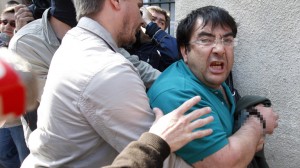
When Xabier López Peña was arrested in Bordeaux in 2008 on terrorism-related offences, he hardly looked like an archetypal leader of ETA. Portly, middle-aged and bespectacled, he didn’t even have the carefully sculptured mullet that so many Basque separatists insist on sporting.
But as he was bundled away by French police, his wild shouts and screams at TV cameras hinted at the true nature of the man. López Peña, who died of a brain haemorrhage on Saturday, was held responsible by many for the collapse of the 2006 peace process that offered the hope of a lasting solution to the Basque conflict.
As a result, many Basque separatists, as well as the mainstream politicians in Madrid, came to see him as a liability, a disastrous figure, even.
With the ETA alias of “Thierry”, he joined the group in the seventies. He was arrested in 1983 for extortion – what the organisation called the “revolutionary tax” – and on his release he fled to Africa, before settling in the south of France, the traditional refuge for etarras, and working his way back up the chain of command.
By the time the 2006 peace process was underway, ETA was on the back foot. In the years leading up to the talks, its members were being arrested at an unprecedented rate, due to effective infiltration by Spanish security forces and, equally importantly, the cooperation of French authorities.
Hopes were high in the Socialist government of José Luis Rodríguez Zapatero that a lasting peace could be reached, without making major political concessions. But in December of that year, López Peña replaced Josu Ternera as ETA’s main representative in the talks and with his arrival, it seems, any hope of peace was buried.
“We can attack wherever we want and however we want. If the [peace] process breaks down, this will turn into Vietnam. We will react to arrests with an attack in Spain.”
These were López Peña’s words at a peace meeting in Oslo, according to Jesús Eguiguren, the Basque Socialist who was present at the talks. Given that calling a halt to all arrests of ETA members was politically impossible for the Spanish government, this stance represented an impasse.
And López Peña was as good as his word, ordering a bomb attack on the car park of Madrid airport’s Terminal 4, on December 30, hours after Zapatero had augured “good news” for the Basque Country in the coming months. A warning ahead of the detonation meant that the area was evacuated, except for two sleeping Ecuadorian men who were killed by the blast.
Although talks continued for some months between ETA and representatives of the government, the attack destroyed any genuine likelihood of an agreement. The legacy of the blast would become López Peña’s legacy: any vestige of belief or trust that the Spanish public still harboured that ETA was serious about peace was obliterated; Zapatero, already facing heavy political pressure for “talking to terrorists”, now had to abandon hopes of a negotiated settlement; and, crucially, ETA’s political support realised that violence was taking it nowhere.
This last factor has pushed the group, slowly but apparently definitively, towards peace over the last 18 months and without even the slight leverage it had in 2006. López Peña and other hardline figures seem to have been marginalised to a great extent, with Basque separatists finding an official, political voice in Bildu.
López Peña left behind two indelible images: the smoking ruins of Barajas airport’s car park and his own desperate ranting on his 2008 arrest. But by the time he died on Saturday, the Basque Country had moved on far enough for him to have become an irrelevant figure.
Leave a Reply
You must be logged in to post a comment.